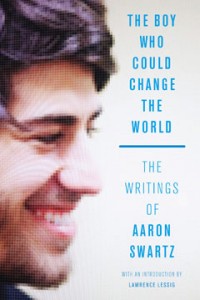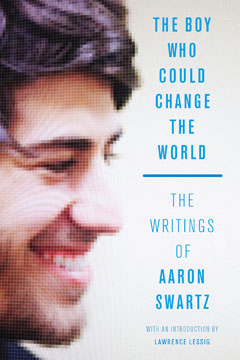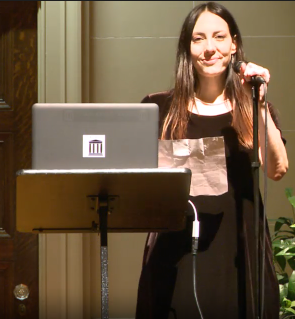Download mp4 Hi-res files of entire event

Update December 2017 – In the course of Lisa’s research for “From DeadDrop to SecureDrop,” (since this post originally went up), she could not find any evidence whatsoever that Aaron ever assisted Wikileaks.
So it would appear that, although the transcript reads that “Wikileaks disclosed three facts” – we don’t in fact know that these are facts.
Here is the original December 5, 2015 post:
Jacob Appelbaum read a powerful statement at this year’s Aaron Swartz Day Celebration.
Here are some highlights. A complete transcription follows.
Quotes From Jacob’s Talk:
Shortly after Aaron was found, WikiLeaks disclosed three facts:
- Aaron assisted WikiLeaks.
- Aaron communicated with Julian and others during 2010 and 2011.
- And Aaron may have even been a source.
I do not believe that these issues are unrelated to Aaron’s persecution, and it is clear that the heavy-handed U.S. prosecution pushed Aaron to take his own life. How sad that he was abandoned by so many in his time of need. Is it really the case that there was no link? Is it really the case that the U.S. prosecutors went after Aaron so harshly because of a couple of Python scripts and some PDFs? No, clearly not…
When we learned more details about the U.S. prosecutors, we learned that they considered Aaron a dangerous radical for unspecified reasons. One of the primary reasons is probably the Guerilla Open Access Manifesto. This is a good document, and, as many others, I respect it and I admire it. The Guerilla Open Access Manifesto is not as radical as the U.S. prosecutors might consider it. But their fear is telling, so let us say it out loud: We should honor it and we should extend it.
Let’s not only liberate the documents of the world, let us act in solidarity to liberate all of humanity. Let us create infrastructure that resists mass surveillance. Let us enable people to leak documents. And let us also work to infiltrate those organizations that betrayed us. There is a division of labor, and we all bring different skills to the table. Let us all use them in service of a better world, in service of justice.
We must have total transparency about the investigation into Aaron. Why was the Department of Justice grinding their axe with Aaron? Was it really because of JSTOR and the past anger about PACER? That is absurd and unbelievable. It is disproportionate and it is unjust.
One concrete thing that needs to happen is for the FOIA case to be properly resolved. We must find a way to speed up the processing about FOIAs regarding Aaron. Rather than hundreds of documents at a time, we should have all 85,000 at once, and not mediated by MIT, who is partially responsible for the outcome we have today.
And we must not drop the pressure. If you are invited to MIT, I encourage you to decline and to explain that you do so because of MIT’s treatment of Aaron Swartz. But not just Aaron, but those like Star Simpson and Bunnie, who MIT would’ve left to be like Aaron, if the cards had played a little differently…
And there is a legal lesson that we actually must learn in a very hard way, as many communities have learned it already, and it is one where the lawyers in the audience who represent me are already cringing from what I’ve said, but they’ll cringe harder next. We must resist grand juries. We must not bow down. We must band together. And together we can refuse to be isolated. We must resist it every step of the way, never giving them anything, ever, at all, when they wish to persecute us for our political beliefs. And if you feel there is no other choice, drag it out and make it public…
Part of what Aaron carried was an understanding that it wasn’t just that something needed to be done. He carried with him the idea that very specific things needed to happen, and for very good reasons, to benefit all of those alive and all of those yet to live. He cared deeply about free software, and he cared deeply about the free culture movement. He worked to advance many other issues. Let us carry on that work, whatever the cost, wherever they may take us.
***Complete Transcription Below***
Lisa: Ladies and Gentlemen, Jacob Appelbaum.
Jacob: First of all, thank you so very much for having me tonight. It’s actually really difficult that I can’t be there in person, and I wish that I could be. And, when Lisa asked me to speak tonight, I actually didn’t feel that I had something to say until I sat down and wrote a text. So, I’m just going to read you a text, and as a result I’m going to cover my camera because there’s nothing worse than watching someone read. So, as you can see there, it’s just a bright white light, and now I’m going to read you this text, and I hope that you can still hear me.
[Crowd chanting “We want Jake!”]
Jacob: (Laughing)
Lisa Rein: Jacob, come back on camera, please. Don’t do it, Jake.
Jacob: I’m sorry. It has to be this way. That’s how it has to be, I’m sorry, but here we go.
Lisa: It’s okay. No, no, no!
Jacob: You can’t fucking be serious. [laughing] Terrible.
Lisa: Jacob, please. Thank you. (Jesus Christ.)
Jacob: Look, I want to see all of you, too, but we don’t get what we want so I’m going to read you this text now.
The first time that I heard Aaron Swartz speak in person was at the Creative Commons release party in San Francisco.
Lisa: Jacob, we’re going to turn it [the podium laptop] around.
Jacob: I was working the door as a security guard, if you can believe that. I think it was in December of 2002. Meeting people in that seemingly weird world mutated life in a good way. Over the years, we crossed paths many times, be it discussions relating to CodeCon, to age limits, or free software, or the Creative Commons, or about crypto, or any other topic. Aaron was an insightful, hilarious, and awesome person.
Aaron and I worked on a few different overlapping projects and I very much respected him. Some of the topics that came up were light, but some were very heavy and very serious. The topic of WikiLeaks was important to both of us. In November of 2009, long before I was public about my work with WikiLeaks, I introduced Aaron to someone at WikiLeaks who shall remain unnamed. If we had a secure and easy way to communicate, if some sort of communication system had existed that had reduced or eliminated metadata, I probably could’ve done so without a trace. But we didn’t. You’re not the first to know, the FBI and the NSA already know.
Less than a year later, Aaron sent me an email that made it clear how he felt. That email in its entirety was straightforward and its lack of encryption was intentional. On July 10, 2010, he wrote, “Just FYI, let me know if there’s anything, ever, I can do to help WikiLeaks.” Did that email cast Aaron as an enemy of the state? Did Aaron worry?
2010 was an extremely rough year. The US government against everyone. The investigation of everyone associated with WikiLeaks stepped up. So many people in Boston were targeted that it was effectively impossible to find a lawyer without a conflict. Everyone was scared. A cold wave passed over everything, and it was followed by hardened hearts from many.
In February of 2011, a few of us were at a party in Boston hosted by danah boyd. Aaron and I walked a third person home. A third person who still wishes to remain unknown. The sense of paranoia was overwhelming, but prudent. The overbearing feeling of coming oppression was crushing for all three of us. All of us said that our days were numbered in some sense. Grand juries, looming indictments, threats, political blacklisting. None of us felt free to speak to one another about anything. One of those people, as I said, still wishes to remain unnamed. We walked through the city without crossing certain areas, because Aaron was worried about being near the properties that MIT owned.
When Aaron took his life, I remember being told by someone in San Francisco, and I didn’t understand. I literally did not understand who they meant or who it could be. It seemed impossible for me to connect the words that were coming out of their mouth with my memories.
Shortly after Aaron was found, WikiLeaks disclosed three facts:
- Aaron assisted WikiLeaks.
- Aaron communicated with Julian and others during 2010 and 2011.
- And Aaron may have even been a source.
I do not believe that these issues are unrelated to Aaron’s persecution, and it is clear that the heavy-handed U.S. prosecution pushed Aaron to take his own life. How sad that he was abandoned by so many in his time of need. Is it really the case that there was no link? Is it really the case that the U.S. prosecutors went after Aaron so harshly because of a couple of Python scripts and some PDFs? No, clearly not.
I wish that Aaron had lived, as we all do. This was the year that brought us the summer of Snowden, and yet it felt like ten years of grief in a single one. It was the last time I spent any time in the U.S., and even now it feels like a distant memory, mostly bad memories. Especially the memory of learning about Aaron.
Only a few months later, in 2013, there was a New Year’s Eve toast with many of us who were being investigated, harassed, and targeted for our work, our associations with WikiLeaks, and for our political beliefs. It was me that stupidly, stupidly said, “We made it.” But I know it was Roger, and I remember it well, when he said, “Not all of us.” And he wasn’t speaking only about Aaron, but him too. And it was heartbreaking to remember, and it was telling of how to cope. How some try to forget, and we do forget, and that it is important to remember. Especially right then and especially right there. Just as it is here, and just as it is right now.
When we learned more details about the U.S. prosecutors, we learned that they considered Aaron a dangerous radical for unspecified reasons. One of the primary reasons is probably the Guerilla Open Access Manifesto. This is a good document, and, as many others, I respect it and I admire it. The Guerilla Open Access Manifesto is not as radical as the U.S. prosecutors might consider it. But their fear is telling, so let us say it out loud: We should honor it and we should extend it.
Let’s not only liberate the documents of the world, let us act in solidarity to liberate all of humanity. Let us create infrastructure that resists mass surveillance. Let us enable people to leak documents. And let us also work to infiltrate those organizations that betrayed us. There is a division of labor, and we all bring different skills to the table. Let us all use them in service of a better world, in service of justice.
We must have total transparency about the investigation into Aaron. Why was the Department of Justice grinding their axe with Aaron? Was it really because of JSTOR and the past anger about PACER? That is absurd and unbelievable. It is disproportionate and it is unjust.
One concrete thing that needs to happen is for the FOIA case to be properly resolved. We must find a way to speed up the processing about FOIAs regarding Aaron. Rather than hundreds of documents at a time, we should have all 85,000 at once, and not mediated by MIT, who is partially responsible for the outcome we have today.
And we must not drop the pressure. If you are invited to MIT, I encourage you to decline and to explain that you do so because of MIT’s treatment of Aaron Swartz. But not just Aaron, but those like Star Simpson and Bunnie, who MIT would’ve left to be like Aaron, if the cards had played a little differently.
Here are some things you can do to support the legacy and spirit of Aaron. We can support the development of some of Aaron’s projects like SecureDrop. Kevin, Garrett, Micah, and others are carrying that torch. We can work with them. They’re still with us today. You can come and work with many people at the Tor Project on Tor Browser and Tor Messenger, and other software to be of use to disseminate and to push out information, important information to people that might have otherwise not happened without that software. And you can come and help us make free software for freedom, just as Aaron did.
And there are other projects that need assistance. OnionShare, Let’s Encrypt, GlobalLeaks, Pawn[?], Subgraph, Signal, the Transparency Toolkit, and many more.
But it isn’t just software. There are so many things that can be done. You can write to prisoners of conscience of Aaron’s generation, of my generation, of your generation. Do Jeremy Hammond, Barret Brown, and Chelsea Manning have to die before we work to correct the injustices that they face daily? We can and we should free them.
Here are some things to support each other during the hard times, those with us now and those sure to come in the future. We should support WikiLeaks, an organization under attack for publishing information in the public interest. We should support the EFF. They support people who are at the edge. We should support the ACLU. When others called Edward Snowden a traitor, the ACLU gave him legal support. We should support the Courage Foundation. They are the ones that helped Edward Snowden to seek and to receive asylum and do the same with others that are directly under threat today and those under threat tomorrow. And we should support the Library Freedom Project. They work to educate, to deploy, and to resist, by deploying alternatives in public spaces for everyone today. And together, we are already building, deploying, supporting, and using infrastructure which is not merely a matter of protest, but is an act of resistance in itself, by being a practical alternative.
And there is a legal lesson that we actually must learn in a very hard way, as many communities have learned it already, and it is one where the lawyers in the audience who represent me are already cringing from what I’ve said, but they’ll cringe harder next. We must resist grand juries. We must not bow down. We must band together. And together we can refuse to be isolated. We must resist it every step of the way, never giving them anything, ever, at all, when they wish to persecute us for our political beliefs. And if you feel there is no other choice, drag it out and make it public.
Consider that the core of Aaron’s legacy is not simply about information or about writing software. It is about justice, about fairness, through transparency, through accountability, through consideration. So then let us consider our empire and most of all we must consider our complicity. It is up to us to act and to change things, to fight for the user, but also to consider the world in which he lives. To think as technologists, but to think far beyond only the technology and into our common humanity.
How is this lesson applied to gender and racial inequality? Aaron wasn’t a bigot; he was thoughtful. He was not a homophobic person; he was accepting. He wasn’t a racist; he was unprejudiced. Aaron was kind and compassionate. He fought for free speech. He worked and he supported your anonymity directly with actions, and he worked to free our culture’s knowledge. We must be forward-thinking, not just about winning one or two battles. Not just about one or two legal cases. Rather in a broader sense, towards a movement of movements. The Internet is a terrain of struggle and it will help shape all of the other terrains of struggles to come, and Aaron, Aaron helped to shape that terrain for us, so that we could shape it for others.
Part of what Aaron carried was an understanding that it wasn’t just that something needed to be done. He carried with him the idea that very specific things needed to happen, and for very good reasons, to benefit all of those alive and all of those yet to live. He cared deeply about free software, and he cared deeply about the free culture movement. He worked to advance many other issues. Let us carry on that work, whatever the cost, wherever they may take us.
Aaron was headstrong and hilarious. He was young. Today, he would’ve been 29. Use your time wisely. May you have more time than him, and may you use it as wisely as he did.
Good night.
 Remembering Aaron Swartz: My Review of “The Boy Who Could Change The World – By Chelsea Manning
Remembering Aaron Swartz: My Review of “The Boy Who Could Change The World – By Chelsea Manning

